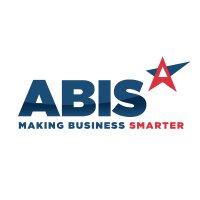ERP vs multiple software: which is more cost effective?
Every growing company eventually faces a difficult financial decision: whether to invest in a multiple software solution to address the IT needs of each separate department (accounting, sales, logistics, etc.) or to invest in a single ERP solution that addresses them all.
To answer this question, let's compare the two solutions in three key financial areas: upfront costs; maintenance and monitoring costs; and software integration costs.
Although every situation is unique, a single ERP solution is consistently the best long-term investment for nearly every enterprise in each of these three key areas.
Upfront costs
From the point of view of purchase price, there is really no need for a detailed comparison. If your company is buying all its enterprise applications from a single software maker in a single purchase, you are bound to get a deep discount per unit. That's how enterprise sales works.
On the other hand, if you are buying your enterprise software piecemeal, you will be paying full price to each separate software maker. This is one of the best reasons to choose a comprehensive ERP solution. You are essentially buying your accounting software, your CRM software, your inventory software, your logistics software, and so on, all from a single software maker in a single purchase. Naturally, each unit will cost you far less than it would under a multiple-software solution.
Read also: ERP software selection - where should I start?
Maintenance and monitoring costs
In 2017, keeping up with the relentless stream of software updates coming at us from all directions is a struggle for even the most cutting-edge companies. As hackers become increasingly advanced, timely security patches are becoming increasingly critical. As product life cycles become ever-shorter, software version updates are happening more often.
At the same time, every enterprise in today's competitive landscape needs to go beyond ensuring that their software is secure, bug-free and updated. In 2017, it is of equal importance to perform 24x7 performance monitoring to ensure that the entire system is running optimally, entirely free of bottlenecks that could slow down the entire company.
Clearly, a site-wide ERP solution is far less costly to maintain and monitor than a loose collection of separate software systems. With some ERP software updating as often as every two weeks, for example, a single update will roll out across the entire enterprise at once. And a single monitoring system is all that is necessary to address performance across the entire system.
Software integration costs
Anyone who has ever tried to integrate two proprietary software applications from two different software makers knows that it can be exasperating and expensive. Moreover, despite the high cost, generally the best one can hope for is a low-level, lightweight integration. Still worse, every time one of the two systems gets an update, the integration often breaks and you have to spend more to fix it.
Implement new software successfully with this step-by-step guide to the ERP implementation process
Nonetheless, as problematic and expensive as it is, integrating two proprietary applications is trivial when compared to the task of integrating five or ten. The problems and costs multiply exponentially to the point that anything beyond sharing the most basic data company-wide often becomes impossible without spending a fortune.
On the other hand, an ERP solution already has this costly problem solved in advance. Complete, enterprise-wide integration comes free. Every software application is specifically designed to work with the others at a high level, sharing rich data and business processes seamlessly across the entire enterprise. On Day One, the accounting software will automatically share data with the CRM software, and the CRM software with the logistics software, and so on.
The clear cost advantage of ERP
For the greatest cost savings, should your growing enterprise invest in a multiple software solution, or a single ERP solution? To answer this question, we've compared the two options from three key financial perspectives:
First we found that the deep discount per application provided by an ERP solution gives ERP the clear purchase-price advantage.
Second we found that the simplicity and efficiency of company-wide updates and performance monitoring under the ERP approach gives ERP a decisive advantage for maintenance and monitoring.
Third we looked at the undeniable cost advantage that ERP's built-in, high-level software integration has over the expensive, low-level integration that company's must settle for under the multiple-software approach. Having compared the two solutions in these three key financial areas, ERP is clearly the best investment for every enterprise planning for a strong financial future.
Free white paper
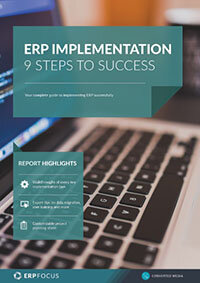
ERP Implementation: 9 steps to success
The 9 proven steps you should follow when implementing ERP
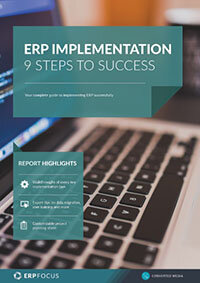
Featured white papers
-
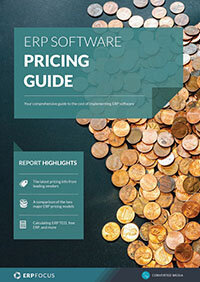
ERP Software Pricing Guide
Get the latest pricing information on over 80 popular ERP systems, and learn how to budget for your ERP project in our free guide
Download -
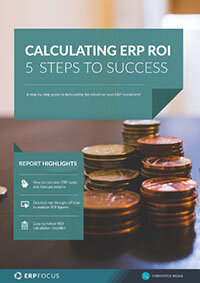
Calculating ERP ROI: 5 steps to success
Calculate your new ERP's financial benefits with this comprehensive guide
Download -
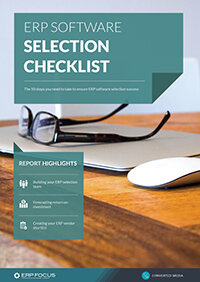
60-Step ERP Selection Checklist
Get the comprehensive checklist for your ERP selection project
Download
Related articles
-

How much does ERP cost? (Free ERP cost and budget guide)
How much does an ERP system cost in 2025? Everything you need to make an ERP software budget
-

CMMC Compliance: What Aerospace and Defense Manufacturers Need to Know
Key insights on CMMC compliance, deadlines, and securing DoD contracts with CMMC 2.0 certificatio...
-

The best ERP systems for process manufacturing
Consider these ERP systems when selecting your next process manufacturing ERP

